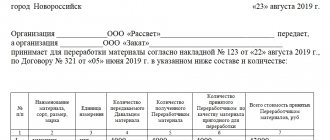The debt of a legal entity can be secured by collateral. If a person does not repay his debt, he will have to give the collateral to the creditor. It can be a variety of resources: cash, property, shares, property rights (clause 1 of Article 336 of the Civil Code of the Russian Federation). Collateral obligations must be correctly reflected in accounting.
Question: The lender, as collateral under a loan agreement, takes as collateral the rights of claim of the borrower that belong to him on the basis of a supply agreement with a third party. Can such a pledge be taken into account in the register of notices of pledge of movable property and how, in such a case, should the subject of the pledge be described? View answer
Accounting for pledge of property and securities
The owner of the property in any case until it is sold at public auction is the principal. The collateral property is listed in the same accounts of the principal as before, but its accounting is carried out autonomously, and analytical accounting records that the property is collateral.
In accounting, the lender and the defaulter use the following accounts:
- off-balance sheet 008 “Guaranteeing obligations, payments acquired” - general information about the progress of acquired guarantees (for the lender);
- off-balance sheet 009 “Guaranteeing obligations, payments issued” - general information about the movement of issued guarantees (for the principal);
- 60 “Settlements with the defaulter” - obtaining ownership of the pledged item by the lender;
- 91 “Other expenses and profits” - for withdrawal.
Number of participants
At the time of signing the agreement to open a collateral account, three representatives, one at a time, must be present:
- jar;
- pledgor;
- mortgagee.
These may be the seller and buyer personally or authorized representatives who have the right to represent their interests legally. An important point is that the bank itself can act as a pledge holder, then the presence of only the pledgor is sufficient.
A pledge is considered to have arisen if:
- The bank was notified of the pledge and received its copy of the agreement. With a tripartite agreement.
- An agreement on the pledge of rights was signed between the pledgors and the bank. In the case where the mortgagee is the bank itself.
Therefore, the number of participants depends on the role of the bank: it acts as an intermediary or a pledge holder.
Accounting for the pledge of goods and other property from the defaulter
The main account assignments used by the accounting service to record actions related to the pledge of goods and other property:
- For goods and finished products: DT 76, KT 90 “Sales”, subaccount. 90-1 “Revenue” - revenue included in profit from ordinary activities, DT 90, subaccount. 90-2 “Cost of sales” - write-off (removal) of the price of goods sold (finished products), inc. 44 “Sale expenses” - accounting for sales expenses, then removing these expenses - DT 90, subaccount. 90-2, count. 009—removal of the price of the collateral.
- For other collateral property: DT 76, CT 91, subaccount. 91-1 “Other profit” - the sales price is included in other income, DT 91, subaccount. 91-2, KT 76 - VAT withholding by the organizer, DT 91, subaccount. 91-2, KT 76 - payment for the services of the organizer (with the deduction of VAT), invoice. 009 - removal of the price of the collateral after its sale.
When selling goods or finished products at open auction, the organization classifies the proceeds as profit from ordinary activities. Fixation is made during the transfer of ownership of this pledged object. When selling other collateral property (materials, etc.), the proceeds are included in other profit on the date of sale.
Is foreclosure or seizure of collateral accounts permitted?
According to Central Bank instruction No. 153, collateral accounts are classified as special, therefore the procedure for opening, maintaining and closing follows separate rules. The pledgor cannot independently manage the money placed on it. Especially in cases where a firm limit is set on the minimum balance. When making demands for taxes or other obligatory payments of the mortgagor, they are addressed to current accounts, and not to special ones.
The Ministry of Finance, in a letter dated February 14, 2017, expressly stated that the fulfillment of tax obligations cannot be applied to collateral accounts. Therefore, the tax authorities will not be able to write off debts under collection orders from accounts of this type. This applies to all funds that are reserved as collateral or are the subject of collateral.
Seizure of the collateral account is allowed only in one case, if the main property of the mortgagor is insufficient to fulfill the obligations. Also, the lender has an advantage over the mortgagee. In other situations, banks do not have the right to seize the account.
about the author
Klavdiya Treskova - higher education with qualification “Economist”, with specializations “Economics and Management” and “Computer Technologies” at PSU. She worked in a bank in positions from operator to acting. Head of the Department for servicing private and corporate clients. Every year she successfully passed certifications, education and training in banking services. Total work experience in the bank is more than 15 years. [email protected]
Is this article useful? Not really
Help us find out how much this article helped you. If something is missing or the information is not accurate, please report it below in the comments or write to us by email
Standard account assignments used in the accounting of the lender and the defaulter on the pledge
Pledge as a way to ensure the fulfillment of collateral obligations is shown on the balance sheet. In a standard situation, when the defaulter, after concluding a pledge agreement upon its completion, is able to repay his debt, standard account assignments are used.
| Lender's accounting for collateral transactions (main account assignments) | Accounting of the principal for collateral transactions (main account assignments) |
| DT 58-3, CT 51 - provision of credit (loan); DT 008 - property was received as collateral (its price under the contract); DT 76, CT 91-1 - crediting interest to the debt under the agreement | DT 51, CT 66, subaccount. “Basic payments on short-term loans” - obtaining a loan (loan); DT 009 - transfer of property as collateral (its price under the contract); DT 66, subaccount. “Principal payments on short-term loans”, KT 51 - repayment of debt under the agreement (and interest); KT 009 - display of return of collateral property |
Thus, the principal’s debt is extinguished, and accordingly, the pledge is removed. When insuring a collateral object, the lender uses the following account assignments:
- The debtor compensates for insurance costs: DT 76-1, CT 51 - insurance payments, DT 76-5, CT 76-1 - insurance costs are included in payments to the debtor, DT 51, CT 76-5 - compensation for insurance costs from the debtor .
- The debtor does not compensate for insurance expenses: DT 76-1, CT 51 - insurance payments, DT 91-2, CT 76-1 - insurance included in other expenses, DT 99, CT 68/PNO - display of PNO (insurance expenses * 20 %).
The principal displays insurance expenses in relation to the collateral object with account assignments: DT 76-1, KT 51 - payment of insurance, DT 91-2, KT 76-1 - inclusion of insurance among other expenses.
How to open
To open a special collateral account with a bank, the presence of both parties who will participate in the transaction will be required. In this case, all funds deposited into the account are converted into collateral. If the parties want to take into account other points when using the account, then all the nuances are specified in additional agreements in writing. Each item is communicated to the parties against signature.
A limit is set on the collateral account, which presupposes:
- the entire balance on the balance sheet is recognized as collateral;
- a “hard” or minimum balance is established on the total amount, which is prohibited from being used as long as the pledge agreement is in effect.
It is important to know! If there is no separate indication in the text of the agreement or contract, then it is considered that the pledgee receives rights to all money placed in the account. In this case, the pledgor has no right to carry out any expenditure transactions at all. When the mortgagee receives the right only to a certain part or to the minimum balance, this must be stipulated in the text of the agreement. In such a situation, the pledgor will be able to carry out transactions, but subject to the established restrictions.
There is no standard form for a security account agreement. Each credit institution has the right to draw up its own sample. But the document must indicate:
- Account number;
- obligations of the parties;
- validity;
- volume of collateral.
The bank enters the remaining fields and details at its discretion.
Taxation on collateral from the lender and the defaulter
Since the ownership of the property when pledged remains with the principal, VAT is not charged in such cases. The cost of the collateral property is not included in the debtor’s expenses for profit tax purposes. Expenses for insuring the collateral object made by the principal are included in other expenses and are taken into account when taxing income.
For the same reason, the lender is not required to calculate VAT or pay income tax when receiving collateral. Expenses on optional insurance of this property are not taken into account for taxation of the lender's profit. The same is stated in PBU 18/02: insurance expenses should be counted among other expenses and not included in income taxation.
The situation does not change in this regard even after the sale of the collateral at open auction. VAT is not calculated on sales. The proceeds are used to pay off the debt, which is not recognized as income and is not taxed. The situation is different when selling the collateral at open auction from the principal. In this case, the auction organizer is considered a tax agent and must pay VAT on sales.
The tax base is the market price of the collateral being sold. VAT is accepted for deduction by the principal if the pledged object is sold by court decision and there is an invoice. When selling out of court, the debtor calculates VAT and issues an invoice. Proceeds from the sale are income that the organization has the right to reduce due to expenses associated with the purchase of property and payment for the services of the organizer.
Example 1. Accounting of a defaulter during the sale of a collateral object at open auction
The car, which is the object of the pledge, was sold at open auction at the market price. In accordance with the Tax Code of the Russian Federation, Art. 146, paragraph 1, an object of VAT taxation is formed. Transactions on the sale of collateral are displayed using standard account assignments.
| Account assignments | Characteristic |
| DT 76, CT 91, subaccount. "Other profit" | The car was sold at public auction |
| DT 91, subaccount. “VAT”, KT 68, subaccount. "VAT" | VAT crediting |
| DT 01, subaccount. “Disposal of fixed assets”, CT 01 “Collateral property” | Displaying a vehicle among disposed vehicles |
| DT 91, subaccount. “Other profit”, KT 01, subaccount. "Retirement of fixed assets" | Removing the book value of a retired vehicle |
| DT 02, KT 91, subaccount. "Other profit" | Credited depreciation |
| DT 66, CT 76, subaccount. "Payment with the defaulter" | Paying off a loan debt |
| DT 009 | Removal of the contractual price of the obligation |
Example 2. Display of transactions for the sale of securities at open auctions with a defaulter
Stroy LLC provided Dara LLC with a loan of up to 5 months at 10% per annum. An agreement was drawn up where Dara LLC agreed to repay the loan along with interest. Securities were used as collateral. Upon expiration of the term, Dara LLC did not pay off the collateral obligations. Stroy LLC has the right to obtain satisfaction from the price of the pledged securities, resorting to the help of the court.
According to the court decision, the securities were put up for public auction and sold. The proceeds exceeded the amount of debt of Dara LLC along with interest. In the accounting department of Dara LLC, all transactions were displayed using standard account assignments.
| Account assignments | Characteristic |
| KT 009 | Removal of collateral |
| DT 76, CT 91, subaccount. "Other profit" | Securities sold |
| DT 66, CT 76 | Repayment of the secured debt along with interest |
| DT 91, subaccount. “Other expenses”, KT 58, subaccount. "Collateral securities" | The book price of the securities sold was removed |
| DT 51, CT 76 | Displaying the difference between revenue and debt with interest |
| DT 91, subaccount. “Other expenses”, CT 99 | Results of open tenders |
The sale of securities is not subject to VAT taxation, therefore in this case VAT is not calculated (Tax Code of the Russian Federation, Article 149, clause 2, clause 12).
Simplified tax system: fulfillment of an obligation using collateral
If the pledgor has not fulfilled the obligations secured by the pledge, the pledgee has the right to sell the pledged property. Since until the sale of the pledged property, the pledgor remains its owner, income from the sale of the pledged property arises from him (Clause 1, Article 346.15, Article 249 of the Tax Code of the Russian Federation). The mortgagee will not have such income.
By agreement with the pledgor, the pledgee can transfer the pledged property into ownership or redeem it with the subsequent offset of its claims secured by the pledge against payment for the acquired property. This is possible both in the event of the auction being declared invalid, and in the absence of the need to conduct the auction.
Sanctions for non-fulfillment (improper fulfillment) of obligations under an agreement secured by a pledge should be taken into account as part of non-operating income on the date of receipt of funds from the debtor (clause 1 of Article 346.15, clause 3 of Article 250, clause 1 of Article 346.17 of the Tax Code of the Russian Federation) .






